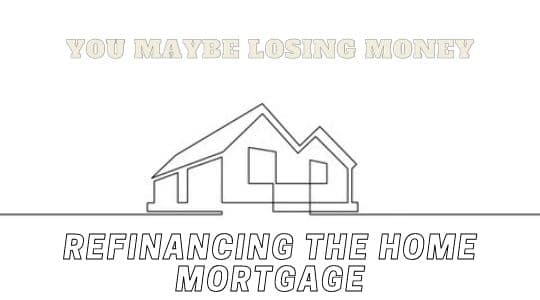Refinancing a Home Mortgage? Stop! Before You Lose Your Money
Refinancing a home mortgage has now become more alluring after the banks cut the prime lending rate by a few basis points. A 30 yr fixed home mortgage hits its rock bottom, available as low as under 3%. What a perfect opportunity for you to join others in this refinance spree!
Don`t fall for this trap, just don`t. What seems to be an opportunity can become a blunder for you. Refinancing a home mortgage may cause you to lose dollars instead of saving you money.
Refinancing a Home Mortgage is not favorable for everyone at all times. You are trading your existing home mortgage for maybe reducing your monthly payments or doing a cash-out refinance. But refinancing an existing mortgage has costs associated with it. You will certainly pay reduced monthly payments but you are simply compounding the load in the longer run.
How Does Refinancing a Home Mortgage Work?
When you buy a home, you originate a mortgage with your lender. The lender writes a mortgage in your name and transfers the money in the name of the seller of the house. Later, when you choose to refinance it. The new or the existing lender originates a new mortgage in your name with better terms and clears the balance of your old mortgage. This is how the refinancing works.
When you refinance your existing home mortgage, you have to go through the same exact process as you have when you first obtained the mortgage.
- File an Application
- Qualifying the Lender`s Requirement
- Go Through the Underwriting Process
- Originating the Loan (Paying Origination Fees)
- Paying Closing Costs
Why Do People Refinance the Home Mortgage?
Primarily, the two major reasons why people consider refinancing their home mortgage include either of these two.
- Lower the Monthly Mortgage Payment
- Tap into the Existing Equity
How To Lower the Monthly Payments By Refinancing Home Mortgage?
The biggest expense in US Households is every month`s Home Mortgage Payment. And with a refinance, you can lower this monthly payment by either

Refinancing with Lower Rates:
Suppose you bought a home by obtaining a mortgage with a bank at 3.5%. Few years down the line, the prime rate decreased and another bank is offering you a lower interest rate of 2.99%. You go to this new bank. They originate you a new mortgage @ 2.99% and clear your old mortgage balance with the old bank. On every $100,000, you will now save $28 every month with this reduced rate on a 30 Yr Mortgage Term.
Mortgage Amount 3.5% ROI 2.99% ROI
$100,000 (For 30 Years) $449/ Month $421/ Month
Refinance to Eliminate Mortgage Insurance
Lenders require you to have mortgage insurance when you have less than 20% equity or when LTV is more than 80%. Mortgage Insurance is very common with FHA Loans where you can finance your home with just 3.5% down. You tend to pay anywhere between $30-$75 for Mortgage insurance every month on top of your monthly mortgage payment.
With time, when your equity in home grows to 20%, you can request the lenders or they automatically eliminate the PMI from your monthly payments. However, if you feel your home price has increased due to appreciation, you can refinance your existing mortgage to eliminate the cost of mortgage insurance.
Say you have a mortgage of $700,000 on which you have already paid $100,000. You are still short on $40,000 to reach the 20% equity threshold to eliminate the monthly mortgage insurance payment. But if you feel your home now is worth $750,000, you can refinance your mortgage. The lender will write you a new mortgage of $600,000 at 80% LTV of $750,000. This means you now have 20% equity and need not pay for monthly mortgage insurance anymore.
Opting For a Longer Tenure Refinance:
When you have a mortgage with a 15-year term, you will have a higher monthly mortgage payment as compared to a 30-year term. On average, you tend to pay 37% lower monthly payments with a 30 yr mortgage term. Doing a Mortgage refinance you can opt for a longer tenure and reduce your monthly mortgage payment.
| Mortgage Amount | Monthly Mortgage Payment (15 Year Term) | Monthly Mortgage Payment (30 Year Term) |
|---|---|---|
| $100,000 (3.5% ROI) | $715 | $449 |
Also Read: Should You Actually Go For a 30 Yr Mortgage?
How To Tap Into Existing Equity By Refinancing Home Mortgage?

When you pay down your mortgage, you gradually build equity. And with a mortgage refinance, you can take out this equity by either doing a cash-out refinance or a HELOC (Home Equity Line of Credit). You can use this equity which was initially tied up to your home for purchasing more assets, doing home improvements, or making other large expenses.
Suppose you have an existing mortgage of $500,000 on your home and your home is now worth $750,000. At 80% LTV, you can refinance your mortgage with a new balance of $600,000 and can use the remaining $100,000 for your expenses.
Also Read: Cash Out Refinance Vs HELOC- Which is Better To Tap Into Existing Equity?
Is Refinancing a Mortgage Worth It?
There are many good reasons to refinancing a mortgage. But what actually makes it worthwhile is how much you are actually saving. After all, refinancing a mortgage involves a cost that you have to bear. And if your savings can recoup the cost involved in refinancing, the refinance is surely worth it.
Case 1:
Imagine yourself saving $100 by a refinance after paying $3600 in closing costs. You will need 3 years to recoup this cost. What if you repay the mortgage or sell this home in 2 years? Do you think your refinance is worth it? If you have a plan to go beyond three years with this mortgage, then only consider refinancing in this case.
Case 2:
Say you refinance a mortgage with a 30 years term instead of 15 years. You will save about $269 per month on every $100,000 financed at an ROI of 3%. But, you will be paying $27,472 more in interest alone in 30 Yrs as compared to 15 Yrs. In order to make this refinance worth, your $269 savings every month should get you more than $27,472 plus refinance costs in the end.
Case 3:
Suppose you pull out $100,000 equity from your home by doing a refinance after 15 years on your original 30 yr home mortgage. Every month your mortgage payment will now increase by $691 when financed at 3% ROI for the next 15 years. The $691 every month for a total of 15 yrs equates to $124,380. So in this case, the $100,000 equity that you pulled out should earn more than $124,380 plus refinance costs to make it a worthwhile refinance.
What are the Costs Associated With Refinancing a Mortgage?

Refinancing a Mortgage is similar to obtaining a new mortgage. You pay mortgage origination fees and closing costs when you refinance a mortgage. However, refinancing with the same lender can get you some discount and you can skip some of the costs involved in obtaining a mortgage. On average, refinancing a mortgage can cost anywhere between 2%-5% of the mortgage amount.
Note: When you are to calculate the refinancing costs, always take into account the opportunity cost that you will either be saving or losing with a refinance.
In general, the mortgage refinance costs includes paying for
- Mortgage Origination Fees
- Application Fees
- Title Insurance Fees
- Survey Fees
- Credit Check
- Appraiser Fees
- Recording Fees
- Underwriter Fees
- Buying Discount Points (If purchased)
- Early Repayment Fees on Old Mortgage (If Applicable)
Can You Qualify For Mortgage Refinance With Low Credit?
It is recommended that you have a credit score above 620 if you have to refinance the mortgage optimally. A low credit score will limit your refinancing options with the lender. You will also not get a good rate and that may defy your purpose of refinancing. Though there are still some options where you can refinance with a low credit score.
- Apply with a Non-Occupying Co-Borrower who can assume the financial responsibility of the Mortgage.
- Non-Credit Qualifying FHA Streamline Refinance that doesn’t require a credit check or an appraisal.
When Should You Consider Refinancing A Home Mortgage?
Refinancing a mortgage involves cost and it’s not just the closing or origination costs. But the costs that you pay or save after a refinance. It is always in your best interest to refinance a home mortgage when you are looking for

Refinancing To a Shorter Term
Got a raise or has your income increased recently? You can consider refinancing for a shorter tenure If you are comfortable with a slightly higher mortgage payment every month. Refinancing to a shorter-term saves you a lot of money that goes towards interest. But remember this is a long commitment and you should proceed with this decision after proper budgeting.
I always recommend doing a refinance for a shorter duration if you think the extra money you will now pay can’t earn more interest than your mortgage interest. A home mortgage is the cheapest form of money that you can get from banks.
Read: How To Get This Cheap Money To Earn More Money For You?
Debt Consolidation:
Mortgage Refinance can be a good option when debt consolidation is on your mind. When you have multiple debts from credit cards or other high-interest debts, a cash-out refinance can help you bring your finances in order. You tend to pay 14%-15% interest on a credit card whereas a home mortgage only costs you 3% or even less.
Changing The Type of Mortgage
If you have an ARM (Adjustable Rate Mortgage) and feel the rate will go higher, you should consider a mortgage refinance with a fixed rate. A fixed-rate mortgage helps you budget your monthly expenses far easier than when you have an ARM.
Buying More Assets:
The secret sauce to scale your rental portfolio and boost your rental income is by refinancing your home mortgage. Make a cash-out refinance when the equity in your home reaches 20% and buy more positive cash flow properties.
Also Read: Business Plan To Become Rich By Buying Rental Properties
Refinance a Home Mortgage For Lower Interest Rates
You can always refinance your home mortgage when you get the best and lower interest rates. But is it a good idea to refinance for just 0.5% or 1%? Some people believe anything less than 2% is not worth refinancing for.
In order to evaluate when you should refinance for lower rates is to take into account all the costs associated with the refinance. A 1% lower interest rate can save you about $50 per month on every $100,000 in a 30 yr period. But in order to save $50 every month, you need to shell about $3000-$5000 upfront in closing costs. So, it’s up to you whether a $50 per month saving is worth paying this much upfront cost or not.
How To Do a Home Mortgage Refinance the Right Way?
When you are considering refinancing your home mortgage, you should always shop around to get the best rates. Get a mortgage estimate from three to four lenders and choose the one that offers the best rates and less closing costs. Having a mortgage estimate, you can save up to 50 bps on the interest rate offered by the lenders.
Remember there is always a scope of negotiation with the lender on the refinancing terms. You need not accept the offer as it is.
Some lenders also let you roll on the closing costs with the mortgage, so you don’t have to pay the closing costs upfront. But these costs will add to your mortgage principal making you pay even more in interest.
The Bottom Line
Refinancing your Home Mortgage can be a good way to achieve financial goals but a homeowner should be careful and run all the numbers before refinancing the actual mortgage. If you aren’t recouping out of refinance, it may not be worth it.
Have You refinanced your home mortgage recently or in the process of doing one? Share your reasons for refinance and whether after reading this article, do you think your refinance is worthy? Do write your comments in the section below.
Wish to receive more such interesting topics in your mailbox every week? Then you must subscribe to our weekly newsletter today. You can also be a member of our Facebook community.


